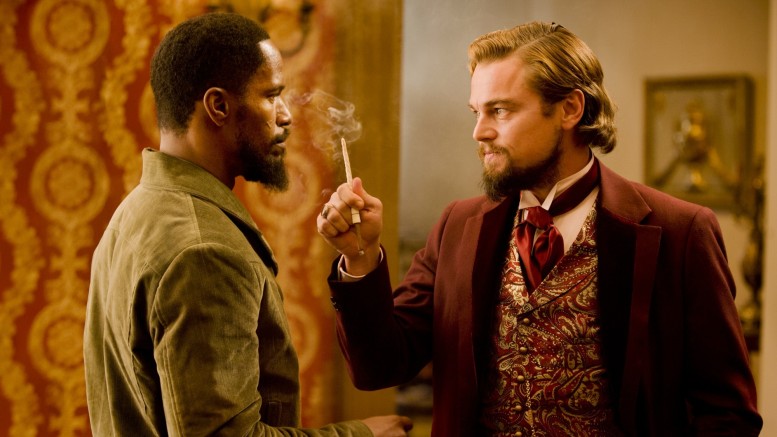Having built himself up as one of cinema’s great auteur directors, Quentin Tarantino has struggled to surpass his finest achievement Pulp Fiction which became iconic for its constructive dialogue and fascinating characters when it was first released back in 1994. Though the likes of Jackie Brown (1997), Kill Bill I & II (2003/04) and Inglorious Basterds were generally well-received, they lacked the audacious elements of his second ‘masterpiece’ (his first being Reservoir Dogs!).
However his latest film, the violent western Django Unchained, manages to reclaim those specific elements as he chooses to revive the ‘spaghetti’ sub-genre and blend it altogether with gratuitous violence as well as paying homage to several lesser-known westerns. There is also the small matter of its versatile cast which includes Jamie Foxx, Leonardo Di-Caprio and Christoph Waltz while awards recognition has already been sprung on the film including a couple of Golden Globe wins and several Oscar nominations. Mr Tarantino, you had my curiosity, now you have my attention….
SYNOPSIS: In the Deep South of 19th Century America, a slave named Django (Foxx) is rescued from capture by a charming but deadly bounty hunter named Dr. King Schultz who decides to use him as a partner. During their pursuit of a couple of rival bounty hunters, Django reveals that once he is free, he intends to find his beloved wife Broomhilda (Washington) who has been forced to work under sadistic plantation owner Calvin Caddie (DiCaprio). The pair travel to Caddie’s home as they look to try and negotiate with him about taking on a bounty even though their main objective is to rescue Django’s beloved from her suffering. However when things turn nasty, our slave-turned-gunslinger instigates one final confrontation to try and save his wife once and for all.
As he did with his depiction of World War II in Inglorious Basterds, Tarantino presents an equally gritty look of the Old West as he relies on old Spaghetti Westerns to influence his film-making through its plot and misc-en-scene. The latter in particular sees him use a Ennio Morricone-style score that is played throughout the film which lends a nostalgic feel to the days of classic Sergio Leone-type westerns.
A running theme that is beginning to occur in the maverick director’s filmography is revenge which shows up here again as Django vows to find his wife but decides to take down those who have troubled the pair in the past. This is all graphically conveyed by the violence, a key part of Tarantino’s films, as his illustration of brutality reaches an all-time best courtesy of the constant blood and gore which occurs throughout. He also refuses to ignore the shocking treatment that the salves endured as he places the Southern mansions and ‘mandingo’ fights into the film to remind us that this was a traumatic period for the African-American race and that while things are better now, there is no moving away from what went on all those years ago.
But amidst the scenes of violence and long-drawn dialogue from the slick script, we do get some light-hearted relief particularly in one scene where a gang of KKK members (including Jonah Hill in a very brief role) have a frank discussion about the uncomfortable masks they wear. It is these type of moments in the film that makes us realise that the director is having a lot of fun as he did with other comical moments in his past productions.
Another key trademark is having a black and white duo as the leading characters which worked out well in Tarantino’s renowned Pulp Fiction as the heart-warming friendship between our two heroes allows us to root for the pair as their story progresses. Jamie Foxx has a lot of fun in his role as Django as he mixes empathy and coolness to his portrayal of a man who eventually develops himself as a bad-ass hero. However he is overshadowed by his more versatile co-stars including the recently Oscar-nominated Christoph Waltz who is terrific as the charming but deadly killer who initially starts out as an anti-hero but becomes more compassionate about the mistreatment of slaves in the film’s final quarter.
A complete surprise is the villainous turn from an-against-type Leonardo Di-Caprio as he tackles the role of the unhinged Calvin Caddie whose vicious and disturbing personality is truly terrifying to watch compared to Di-Caprio’s previous on-screen portrayals. Just as tyrannous is Samuel L. Jackson as the vindictive and loyal butler of Caddie who is more prepared to betray his own race rather than to help a fellow ‘brother’. The stunningly-beautiful Kerry Washington is sadly reduced to being the helpless victim who uses her facial expressions to show her fragile side and is never given much of a chance to shine but is still an alluring sight nonetheless.
One major criticism that does detract Tarantino’s directing style is his excessive use of racial language which is driven to complete overload as the ‘n’ word gets spoken hundreds of times. While this was a tough period in US history that was blighted by the harsh treatment of African-American people, it is bound to unsettle some audiences who won’t be prepared to handle a film which overwhelmingly uses countless racist dialogue. Think of it as a dramatic (and present day version) of Blazing Saddles! The director also makes the bizarre decision to use a strange Australian accent in his short role (something he has done in his previous films) which isn’t necessarily needed considering the time the story is set but at least he gets an explosive send-off!
VERDICT: Despite its overly use of the ‘n’ word, the D stands for delightful as Tarantino’s latest violent spectacle tackles the Old West with true grit and influential-style while the likes of Foxx, Waltz and Di-Caprio saddle up and give roaring performances.


Be the first to comment on "Django Unchained – ★★★★ (1/2)"